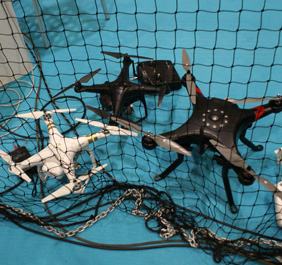Vodafone reports trials of air traffic control drone tracking. The telecoms firm uses 4G Internet of Things (IoT) to protect aircraft from accidents besides prevent inadvertent or criminal drone incursions at sensitive locations such as airports, prisons and hospitals.
Commercial civilian drones are too small to be tracked by conventional radar. They present a risk to pilots, particularly at airfields and airports. Drones are also used for criminal purposes such as drug smuggling and delivering contraband to prisons. Security and intelligence services are concerned that terrorists could use drones adapted to carry small but lethal explosive payloads to attack locations targeted using GPS.
Vodafone says its IoT drone tracking trials support the objectives of the European Aviation Safety Agency (EASA), with whom Vodafone has collaborated. EASA is developing new pan-European rules to regulate the operation of drones.
Vodafone has developed a Radio Positioning System (RPS) for drones. This uses a 4G modem and SIM embedded within each drone to enable real-time tracking of each drone (with up to 50 metre accuracy) by drone operators and authorised bodies such as air traffic control; over-the-horizon/beyond line-of-sight control by the operator, greatly reducing the risk of accidental incursions when operators lose sight of their drones; protective geofencing, with drones pre-programmed to land automatically or return to the operator when approaching predetermined exclusion zones (such as airports and prisons); emergency remote control intervention to provide the authorities with the means of overriding a drone operator’s control to alter a drone’s flight path or force it to land; and SIM-based e-identification and owner registration.
The firm says RPS location data is harder to hack or spoof than GPS location data, and the data connection used to control the drone offers the operator advantages over drone radio control protocols including greater resilience and over-the-horizon real-time feedback.
The Vodafone RPS is combined with Artificial Intelligence algorithms – also developed by Vodafone – to enable large numbers of drones to be tracked and controlled remotely. Vodafone says that it has placed its RPS research and associated intellectual property in the public domain with no licensing fees for re-use to accelerate drone safety and geolocation.
In a preliminary trial in late 2017 – the first of its kind, the company reports – Vodafone used its 4G network to control a 1.3 metre wingspan, 2 kilogram X-UAV drone. Throughout the preliminary trial – over a 32-kilometre course around the town of Isla Mayor, near Sevilla in Spain – the drone transmitted a real-time HD video feed and flight data including speed, RPS location and GPS coordinates.
Further trials are scheduled in Spain and Germany in 2018 with the intention of making the Vodafone drone tracking and safety technology available for commercial use from 2019. The technology behind RPS will also be used in other IoT devices – from luggage tags to bicycles. RPS could support, or replace, GPS in some IoT devices, enabling better location tracking, particularly indoors, the creation of smaller devices, the company adds.
Vodafone Group Chief Technology Officer Johan Wibergh, said: “This groundbreaking innovation by Vodafone will help to ensure the skies stay safe as drones become ubiquitous, everywhere.”










